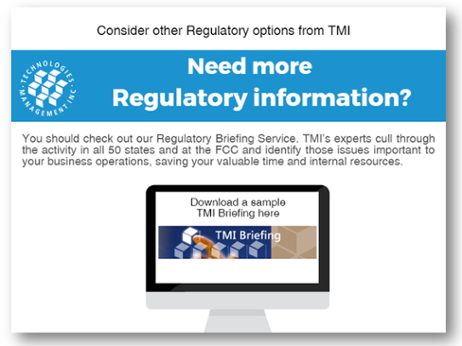 Today: US Senate Passes Telecom Legislation, FCC Action on Wireless Radio Service License Renewals, FCC Issues Another Robocall Fine
Today: US Senate Passes Telecom Legislation, FCC Action on Wireless Radio Service License Renewals, FCC Issues Another Robocall Fine
US Senate Passes Telecom Legislation
Before the August recess, the U.S. Senate passed six technology and telecommunications bills that were approved by the Commerce, Science, and Technology Committee in January but were stalled due to an impasse over the failure to reconfirm FCC Commissioner Rosenworcel. (She was eventually reconfirmed. See the Regulatory Mix dated 8/4/17.) The following bills were passed:
- S. 19, Making Opportunities for Broadband Investment and Limiting Excessive and Needless Obstacles to Wireless Act (MOBILE NOW Act), Legislation to increase spectrum availability for next-generation gigabit wireless services and foster broadband deployment.
- S. 96, Improving Rural Call Quality and Reliability Act of 2017, Legislation to require the FCC to establish quality and reliability standards for rural phone networks.
- S. 123, Kari’s Law Act of 2017, Legislation initiated after the murder of Kari Hunt in a Texas hotel room. Kari’s daughter was unable to call 911 due to a required “9” prefix on the hotel phone. This legislation bans the requirement of a prefix when dialing 911 for assistance.
- S. 134, Spoofing Prevention Act of 2017, Legislation to stop the transmission of misleading or inaccurate caller ID information, including calls and text messages originating overseas.
- S. 174, Federal Communications Commission Consolidated Reporting Act of 2017, Legislation to require the FCC to condense duplicative reports on competition in the telecommunications market into one comprehensive report released every two years.
- S. 88, Developing Innovation and Growing the Internet of Things Act (DIGIT Act), Legislation to bring together private sector and government entities to assess the needs of the Internet of Things (IoT) and study the readiness of government to support the IoT.
US Senator John Thune (R-S.D.) chairman of the Committee said, in part: “The Senate’s passage of these bipartisan bills brings us a step closer to increasing access to spectrum that powers our 21st century tech economy, improving the quality and reliability of phone calls in rural communities, removing barriers to dialing 911 in emergencies, and cutting inefficiencies in federal bureaucracy.”
FCC Chairman Ajit Pai, who has championed making sure 911 can be dialed without a prefix, issued a statement on the passage of the federal version of Kari’s Law saying, “I am pleased that the U.S. Senate unanimously passed Kari’s Law. This legislation will help ensure that every call to 911 directly connects those in need with those who can help. I also commend Hank Hunt, Kari's father, for channeling his pain into a passion for change. Thanks to his efforts and those of many others, Americans will one day be able to call 911 and reach first responders without having to dial an access code. I hope that this critical public safety measure will soon become law.” in part, “
FCC Action On Wireless Radio Service Renewals
The FCC voted to streamline and harmonize its license renewal and service continuity rules to ensure that Wireless Radio Services (WRS) licensees have a consistent framework and use spectrum to benefit all Americans. The new rules include:
- a consistent standard for renewing wireless licenses;
- safe harbors providing expedited renewal for certain licensees;
- automatic termination of any license on which a licensee permanently discontinues service or operation; and
- construction obligations when portions of licenses are sold.
The FCC also adopted a Further Notice of Proposed Rulemaking that seeks comment on a range of ideas to facilitate continued investment during the renewal terms.
FCC Issues Another Robocall Fine
 The FCC proposed an $82 million forfeiture against a health insurance telemarketer that made more than 21 million illegally spoofed robocalls. According to the FCC, Best Insurance Contracts and its owner/operator, Mr. Philip Roesel (doing business as Wilmington Insurance Quotes) displayed inaccurate caller ID information when making robocalls in an effort to sell health insurance, which especially targeted vulnerable consumers, including the elderly, the infirm, and low income families. The FCC has been focusing on robocalling over the past few months and recently issued two other robocalling fines. See the Regulatory Mix dated 6/26/17 and 7/17/17. In addition, it has opened several rulemakings seeking comment on ways to stop illegal robocalling.
The FCC proposed an $82 million forfeiture against a health insurance telemarketer that made more than 21 million illegally spoofed robocalls. According to the FCC, Best Insurance Contracts and its owner/operator, Mr. Philip Roesel (doing business as Wilmington Insurance Quotes) displayed inaccurate caller ID information when making robocalls in an effort to sell health insurance, which especially targeted vulnerable consumers, including the elderly, the infirm, and low income families. The FCC has been focusing on robocalling over the past few months and recently issued two other robocalling fines. See the Regulatory Mix dated 6/26/17 and 7/17/17. In addition, it has opened several rulemakings seeking comment on ways to stop illegal robocalling.
Do you need more details on this issue? For complete summaries, check into TMI Briefings dated 3/28/17, 7/12/17, and 7/25/17.
_____________________________
The Regulatory Mix, TMI’s daily blog of telecom related regulatory activities, is a snapshot of PUC, FCC, legislative, and occasionally court issues that our regulatory monitoring team uncovers each day. Depending on their significance, some items may be the subject of a TMI Briefing.




